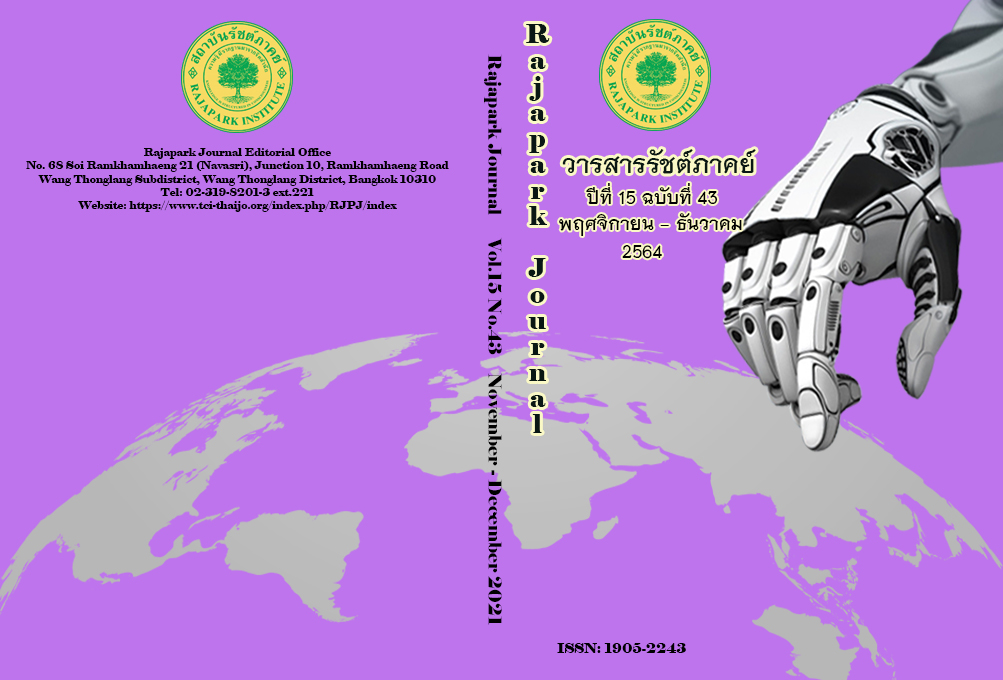Vocational Institution Management in the Pandemic Disruption: Challenges, Successions and Opportunities with “HACCP” Model
Main Article Content
Abstract
The purpose of this study was to present vocational institution management in the context of pandemic disruption in the framework of challenges, succession, and opportunities that were developed as a result of the study, analysis of documents, research and articles, and interviews with the director of the vocational institution. The result of the study showed that: 1) Challenges of vocational institution management were digital equipment access, internet connection, and vocational competency development; and 2) Opportunities and succession of vocational institution management were students’ digital skills, self-directed learning, and independent working skill and opportunities to apply technology to online teaching. The successions were the teacher’s awakening to searching for digital activities to apply in teaching and quality assurance systems. The researcher introduced vocational institution management in the future with the “HACCP” model. The “HACCP” model consisted of the following components: (1) H-hybrid academic management strategies means academic management strategy combining with both synchronous and asynchronous learning; (2) A-agile mindset means the attitudes of personnel should be flexible or agile; (3) C-commitment to navigate challenges means a commitment of employees to face challenges and lead the way to success; (4) C-continuous development means the continuous professional development of teachers to have suitable skills for teaching and learning in a digital format and continuous college development via a quality assurance system; and (5) P- partnership strategy, a strategy for creating participation both within and outside the institution. This “HACCP” model will be a guideline for the development of vocational institution management in order to prepare for future changes sustainably.
Article Details
Views and opinions appearing in the Journal it is the responsibility of the author of the article, and does not constitute the view and responsibility of the editorial team.
References
British Council. (2021). How are Vocational Institutions Innovating, Evolving and Changing as a Result of COVID-19?. Retrieved July 5, 2021, from https://www.britishcouncil.org/education/skills-employability/research/innovating-vocational-institutions-covid-19
Chait, D. (2020). How great leaders navigate unprecedented challenges. Retrieved August 5, 2021, from https://www.greenhouse.io/blog/how-great-leaders-navigate-unprecedented-challenges
Daniel, J. (2020). Education and the Covid-19 Pandemic. Retrieved July 30, 2021, from https://link.springer.com/article/10.1007/s11125-020-09464-3
Eastern Special Development Zone Act B.E. 2561 (2018). Retrieved August 22, 2021, from https://www.eeco.or.th/en/filedownload/1148/file_English%20version
Han, X., Zhou, Q., Shi, W., & Yang, S. (2020) Online Learning in Vocational Education of China During COVID-19: Achievements, Challenges, and Future Developments. Journal of Educational Technology Development and Exchange, 13(2), 61-82.
Hayashi, R., Jayasundara, A., Garcia, M., Balasuriya, A., & Hirokawa, T. (2021). COVID-19 Impact on Technical and Vocational Education and Training in Sri Lanka. Retrieved June 30, 2021, from https://www.adb.org/publications/covid-19-impact-tvet-training-sri-lanka
International Labour Organization and World Bank. (2021). Skills Development in the Time of COVID-19: Taking Stock of the Initial Responses in Technical and Vocational Education and Training. Retrieved June 20, 2021, from https://www.ilo.org/skills/areas/skills-training-for-poverty-reduction/WCMS_766557/lang--en/index.htm
Koednet, A., Samutpaochunda, P., & Pinchinda, P. (2021). Online Classroom Management with the Smiles Model to Enhance a New Normal Learning in the Education Transformation through Digital Technology. Panyapiwat Journal, 13(1), 294-307.
Mathuros, S. (2021). Management Education Online in the New Normal COVID-19. Rajapark Journal, 15(40), 33-42.
Organisation for Economic Co-operation and Development [OECD]. (2021). Implications of the COVID-19 Pandemic for Vocational Education and Training. Retrieved July 15, 2021, from https://www.oecd.org/education/implications-of-the-covid-19-pandemic-for-vocational-education-and-training-55afea00-en.htm
Rohitasthira, B. (2020). Preparation of the Ministry of Education Before Semester July 1, 2020. Retrieved June 30, 2021, from https://moe360.blog/2020/05/08/
Singlor, T. (2021, June 18). Vocational Institution and the Adaptation of Subjects and Teaching to align with Changing Labor Market from COVID-19. SDG Move. Retrieved July 10, 2021, from https://www.sdgmove.com/2021/06/18/changes-vocational-education-trainings-institutions-amid-and-after-covid19/
Thansuvan, C. (2021). Interview about Situation, Challenges, Succession and Opportunities of COVID-19 to Vocational Institutional Management. Interviewed. July 29, 2021.
The King’s Philosophy. (2021). The King’s Philosophy for National Sustainable Development. Retrieved August 14, 2021, from https://sites.google.com/site/sastrphraracha2513/hlak-kar-thrng-ngan-khxng-phrabath-smdec-phraceaxyuhaw-23-khx
Thirapatarapong, V. (2020). Strategies of Mindset Adjusting to Drive Agile Organization. Retrieved July 10, 2021, from https://techsauce.co/news/finding-the-right-mindset-to-drive-an-agile-organization
Vocational Education Development Plan B.E. 2560 – 2579 (2017-2036). Retrieved August 22, 2021, from http://www.lampangvc.ac.th/2021/admin/ckfinder/userfiles/files/ITA/2563/%E0%B8%9E%E0%B8%A3%E0%B8%9A/O6-6.pdf


